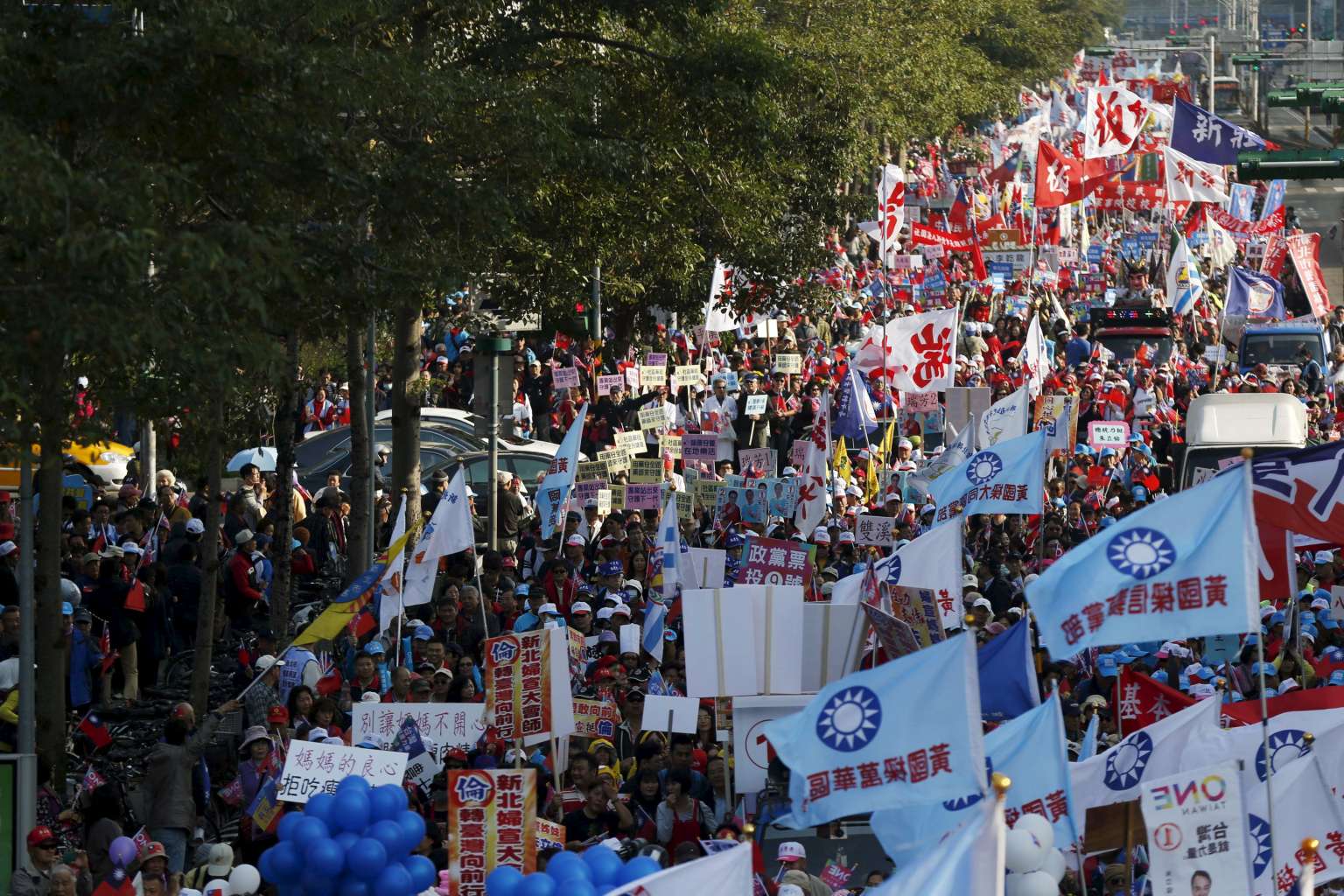EDITORIAL NOTES
Taiwan's unpredictable future: The China Post
Sign up now: Get insights on Asia's fast-moving developments

Supporters of Taiwan's ruling Nationalist Party, or Kuomintang (KMT), take part in a rally in Taipei on Jan 9, 2016.
PHOTO: REUTERS
Follow topic:
The last hustings by the three presidential candidates are over.
Mr Eric Chu, Dr Tsai Ing-wen, and Mr James Soong have all presented their cross-strait policies. But only Dr Tsai, the Democratic Progressive Party's (DPP) standard bearer, did not make her position clear.
Dr Tsai was questioned throughout the three hustings and two presidential television debates on how to maintain the "status quo" across the Taiwan Strait without accepting the "1992 Consensus", which the People's Republic of China (PRC) has laid down as an indispensable condition for the continued peaceful development of relations with self-ruled Taiwan.
The consensus reached in 1992 is an unsigned arrangement, known as "one China with different interpretations", under which both Taipei and Beijing agreed that there is but one China, the definition of which can be orally and separately enunciated.
The consensus reached in 1992 is an unsigned arrangement, known as "one China with different interpretations", under which both Taipei and Beijing agreed that there is but one China, the definition of which can be orally and separately enunciated.
As Dr Tsai was queried on her choice of many bases for the cross-strait policy - the DPP platform of Taiwan independence, the "two-China" principle, and the "Republic of China (Taiwan) as a government in exile" theory - she conceded that the "1992 Consensus" is an option, though she defined it as the spirit of an agreement reached by negotiators of both sides through an exchange of letters.
She only promised not to provoke China and induce any shocking "surprise".
Both Mr Chu and Mr Soong, chairmen of the Kuomintang (KMT) and the People First Party (PFP), respectively, want to continue the cross-strait status quo in accordance with the tacit agreement under which the dispute of sovereignty is shelved in order to resolve urgent issues facing the two sides.
Taiwanese will go to the polls this Saturday to elect the President and a new Legislative Yuan or parliament.
All public opinion surveys have predicted Tsai will win by a landslide and her party could knock out the ruling KMT and also control the Legislature for the first time since legislative elections began in Taiwan.
If the predictions are borne out, Taiwan will face an unpredictable future.
Taiwanese will go to the polls this Saturday to elect the President and a new Legislative Yuan or parliament.
All public opinion surveys have predicted Tsai will win by a landslide and her party could knock out the ruling KMT and also control the Legislature for the first time since legislative elections began in Taiwan.
If the predictions are borne out, Taiwan will face an unpredictable future.
The chances are that Taiwan will re-experience in the next four years what occurred during the eight years of President Chen Shui-bian's rule.
Chen, who was also a member of the DPP, promised not to abolish the National Unification Council and the Guidelines for National Unification in his two inaugural speeches, but pushed cross-strait relations into the verge of confrontation, and was called "troublemaker" by then US President George W. Bush.
Taiwan also sank deeper in economic doldrums.
President Ma Ying-jeou ended Chen's "exclusion of Taiwan" vis-a-vis the rising China when he took power 2008, but has failed to pull the country out of its long economic downturn and is now deeply unpopular, thanks in part to the DPP's obstruction of Bills that would further improve cross-strait relations.
Dr Tsai's victory will force China to withhold concessions in trade and investment with a Taiwan whose government does not accept the fact that the people on both sides of the strait are family even as the island relies ever more on China for its economic growth.
President Ma Ying-jeou ended Chen's "exclusion of Taiwan" vis-a-vis the rising China when he took power 2008, but has failed to pull the country out of its long economic downturn and is now deeply unpopular, thanks in part to the DPP's obstruction of Bills that would further improve cross-strait relations.
Dr Tsai's victory will force China to withhold concessions in trade and investment with a Taiwan whose government does not accept the fact that the people on both sides of the strait are family even as the island relies ever more on China for its economic growth.
Taiwan will therefore risk being marginalised in the relentless global economic integration.
Another result will be Taiwan losing its diplomatic allies. Taiwan now maintains diplomatic relations with 22 countries. Most of them would sever ties with Taiwan unless Taipei resumes the "dollar diplomacy" of the Chen Shui-bian era.
However, Taiwan no longer has enough money to buy opportunistic friends. It may become a diplomatic orphan in no time.
Elections are free but voters may have to pay a price for the results. If there is no viable opposition party to check the administration, the voters will pay even more.
*The China Post is a member of The Straits Times media partner Asia News Network, a grouping of 22 newspapers seeking to promote coverage of Asian affairs.
Elections are free but voters may have to pay a price for the results. If there is no viable opposition party to check the administration, the voters will pay even more.
*The China Post is a member of The Straits Times media partner Asia News Network, a grouping of 22 newspapers seeking to promote coverage of Asian affairs.

